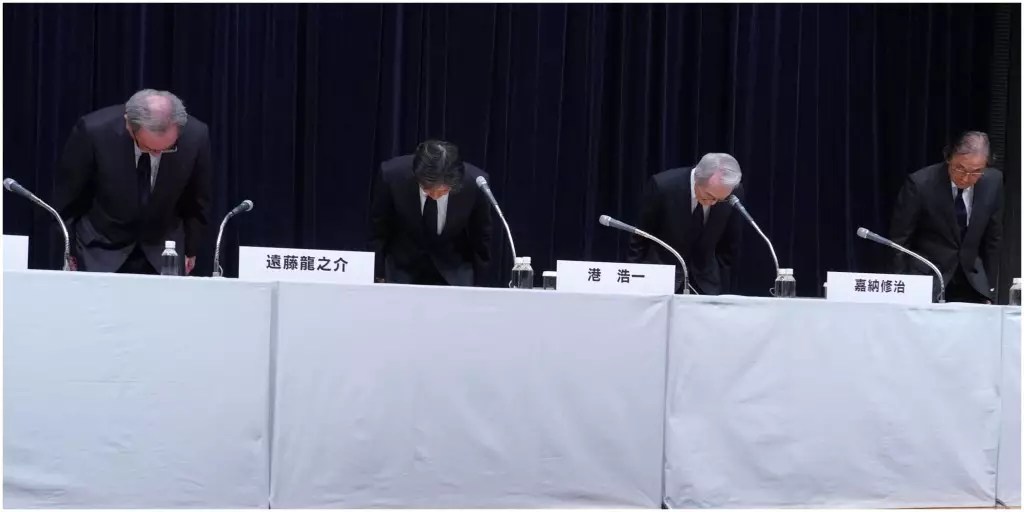In a dramatic turn of events, the Chairman and President of Japan’s prominent broadcasting network Fuji TV have stepped down in the wake of a serious scandal involving their former TV presenter Masahiro Nakai. This decision comes at a time when public trust in media institutions is at an all-time low, igniting conversations around accountability in the industry. In an emotionally charged press conference, Fuji TV Chair Shuji Kano and Koichi Minato, head of Fuji Media Holdings’ television branch, formally announced their resignations. Their simultaneous bowing, a customary sign of apology and respect in Japan, signified the gravity of the situation and the immense pressure placed on the leadership to respond to overwhelming public outcry.
Kano and Minato’s resignations mark a crucial moment for Fuji TV, especially given that the allegations against Nakai extend beyond mere misconduct; they touch upon issues of workplace culture and the protection of individual rights. Kenji Simizu, who has been appointed as the new President of Fuji TV, pledged to initiate a culture reset within the organization. His commitment to “starting from scratch” suggests a deep recognition of the failures that have occurred under previous leadership, as he aims to restore viewer and advertiser trust.
In the wake of these allegations, Fuji TV has witnessed a swift and heavy backlash from advertisers. Many companies, responding to allegations of a cover-up by Fuji executives concerning Nakai’s actions—specifically, a reported sexual assault at a corporate dinner—have pulled their advertisements from the channel. This rapid withdrawal underlines the increasingly critical role that media institutions play not just in entertainment, but also in shaping societal norms and ethics. The financial impacts of these advertiser withdrawals could be severe, potentially jeopardizing the network’s long-term viability.
As the company grapples with these significant repercussions, they are also contending with calls from the Japanese government to restore public confidence, underscoring the comparative fragility of media reputations in the contemporary landscape. Fuji TV’s commitment to establish a third-party committee for a thorough investigation into the allegations aligns with broader trends in corporate governance. Companies globally, particularly in the media sector, are under heightened scrutiny to enforce transparency and accountability practices.
Internally, the response to Nakai’s allegations reveals a troubling pattern within the Japanese entertainment industry—one where the consequences of misconduct are often downplayed in favor of maintaining appearances. Reports indicate that Fuji executives were aware of the allegations against Nakai yet opted for secrecy, justifying their inaction by citing concern for the woman’s wellbeing. Such approaches raise critical questions about the ethics of decision-making within organizations and highlight an urgent need for transformative leadership that prioritizes integrity over reputational management.
As this scandal unfolds, it not only reflects poorly on Fuji TV but also epitomizes the overarching crisis that has gripped the Japanese entertainment sector in recent years. This trend is underscored by numerous allegations against high-profile individuals within the industry, mostly linked to the late talent agent Johnny Kitagawa. These revelations have compelled public figures and executives alike to recognize the systemic issues at play, prompting a societal reckoning with issues of abuse, power dynamics, and the pressing need for reforms.
In light of these shocking events, Kenji Simizu’s appointment as the new President of Fuji TV signifies a potential turning point for the network. His vows to foster an environment that respects human rights and to unwaveringly dismantle any existing culture of silence signal a desire for genuine transformation. The effectiveness of these commitments, however, will be tested as the results from the independent investigation are expected by the end of March.
The future of Fuji TV, and by extension the Japanese media landscape, hinges on transparency and accountability. Organizations must learn from their mistakes, embracing systemic change that not only responds to immediate crises but also fosters a culture of respect, dignity, and empowerment for all industry participants.
As societal expectations shift and the public demands higher standards, the fallout from the Nakai scandal serves as a stark reminder of the importance of integrity in media. The event stands as a critical juncture, not just for Fuji TV, but for all media organizations navigating the evolving landscape of accountability and ethical responsibility.


Leave a Reply